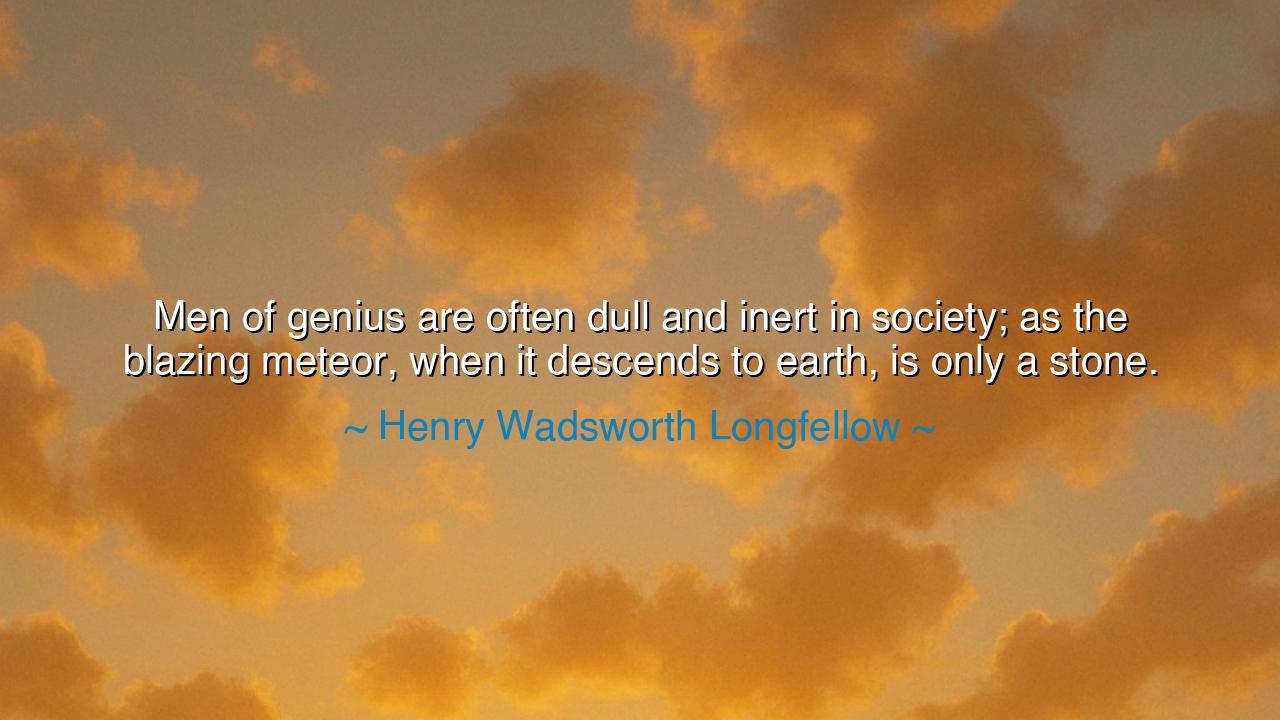
Men of genius are often dull and inert in society; as the blazing
Men of genius are often dull and inert in society; as the blazing meteor, when it descends to earth, is only a stone.






Hear the words of Henry Wadsworth Longfellow, the poet who clothed eternal truths in lines of fire and light: “Men of genius are often dull and inert in society; as the blazing meteor, when it descends to earth, is only a stone.” These words speak of the paradox of greatness—that those who shine most brightly in the realms of imagination, creation, and thought may appear ordinary, even unimpressive, when measured by the customs and judgments of daily life. For the radiance of the meteor is not in its resting form upon the ground, but in the journey, the fire, the brilliance that once set the heavens alight.
The ancients understood this truth well. Socrates, that greatest of philosophers, appeared shabby and awkward in the company of noblemen, wandering barefoot, his garments plain, his manner strange. To the superficial eyes of society, he seemed dull, perhaps even foolish. Yet within him burned a fire that reshaped thought itself, a brilliance unseen by those who judged only by appearances. So too Longfellow reminds us: the stone may look ordinary when it rests in the dust, but it was once a star blazing across the sky.
Consider the story of Isaac Newton. By the accounts of his contemporaries, Newton was solitary, awkward, and withdrawn, often silent in gatherings, inattentive to the ordinary affairs of men. In society, he seemed inert, uninterested in the common entertainments of his age. Yet in the silence of his study, his mind was a storm of light, conceiving the laws of motion and gravity that would forever change our understanding of the universe. To the casual eye, he was but a stone; to the world of knowledge, he was a blazing meteor.
This truth is not confined to science or philosophy. Many artists, musicians, and poets have seemed absent-minded, clumsy, or unimpressive in worldly matters. Vincent van Gogh lived poor and unknown, considered strange and broken by those around him. Yet within his troubled soul blazed colors no eye had seen before, visions that would one day transform art. Longfellow’s words capture this mystery: the men of genius may pass unrecognized in their own age, their fire unseen by a society that measures only surfaces, yet their light endures long after their time.
O seeker of wisdom, take this lesson to heart: do not be quick to judge by outward appearance. Greatness is often cloaked in ordinariness. The teacher in humble garments may hold treasures of wisdom. The quiet child, awkward in play, may one day change the world. The true brilliance of the meteor is not in what it becomes when it falls, but in the glory of its burning flight. Thus, respect all, and learn to see with deeper eyes.
Let your spirit also be at peace if you feel misunderstood or undervalued by the society around you. Do not despair if you seem dull or awkward in company. Remember that many who changed the course of history were uncelebrated in their daily lives. What matters is not the chatter of others, but the fire of your own work, the blaze of your own vision, the mark you leave upon the world. The judgment of men fades; the light of genius endures.
In practice, cultivate humility. Honor the gifts of others, even when they are not clothed in charm or polish. Encourage the quiet, the overlooked, the strange, for among them may be hidden the next great light of the world. And within yourself, nurture your fire, even if society does not recognize it. Do not measure your worth by applause, but by the integrity of your creation and the courage of your journey.
So I say unto you: remember Longfellow’s wisdom. Men of genius may appear to be mere stones, yet they are meteors that once blazed with celestial fire. Do not judge greatness by appearances, nor despise the quiet souls among you. For the heavens themselves remind us: even the brightest stars may fall silently to earth, yet their light is never truly lost.






AAdministratorAdministrator
Welcome, honored guests. Please leave a comment, we will respond soon